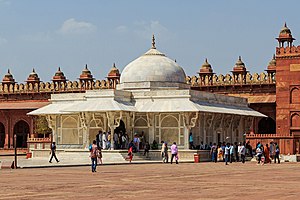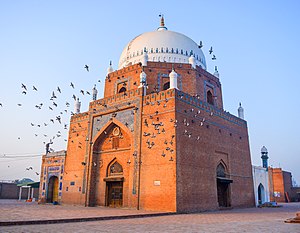Dargah
A dargah (Persian: درگاه dargâh or درگه dargah, Turkish: dergâh, Hindustani: dargāh दरगाह درگاہ, Bengali: দরগাহ dôrgah) is a shrine or tomb built over the grave of a revered religious figure, often a Sufi saint or dervish.
Sufis often visit the shrine for ziyarat, a term associated with religious visitation and pilgrimages. Dargahs are often associated with Sufi eating and meeting rooms and hostels, called khanqah or hospices. They usually include a mosque, meeting rooms, Islamic religious schools (madrassas), residences for a teacher or caretaker, hospitals, and other buildings for community purposes.





The same structure, carrying the same social meanings and sites of the same kinds of ritual practices, is called maqam in the Arabic-speaking world.
Dargah today is considered to be place where saints prayed and mediated (their spiritual residence). Shrine is modern day building which encompasses of actual dargah as well but not always.
Etymology
Dargah is derived from a Persian word which literally means "portal" or "threshold." The Persian word is a composite of "dar (در)" meaning "door, gate" and "gah (گاه)" meaning "place". It may have a connection or connotation with the Arabic word "darajah (دَرَجَة)" meaning "stature, prestige, dignity, order, place" or may also mean "status, position, rank, echelon, class" Some Sufi and other Muslims believe that dargahs are portals by which they can invoke the deceased saint's intercession and blessing (as per tawassul, also known as dawat-e qaboor[Persian: da‘wat-i qabũrدعوتِ قبور, "invocations of the graves or tombs"] or ‘ilm-e dawat [Persian: ‘ilm-i da‘wat عِلمِ دعوت, "knowledge of invocations"]). Still others hold a less important view of dargahs, and simply visit as a means of paying their respects to deceased pious individuals or to pray at the sites for perceived spiritual benefits.
However, dargah is originally a core concept in Islamic Sufism and holds great importance for the followers of Sufi saints. Many Muslims believe their wishes are fulfilled after they offer prayer or service at a dargah of the saint they follow. Devotees tie threads of mannat (Persian: منّت, "grace, favour, praise") at dargahs and contribute to langar and pray at dargahs.
Over time, musical offerings of dervishes and sheikhs in the presence of the devout at these shrines, usually impromptu or on the occasion of Urs, gave rise to musical genres like Qawwali and Kafi, wherein Sufi poetry is accompanied by music and sung as an offering to a murshid, a type of Sufi spiritual instructor. Today they have become a popular form of music and entertainment throughout South Asia, with exponents like Nusrat Fateh Ali Khan and Abida Parveen taking their music to various parts of the world.
Throughout the non-Arab Muslim world
Sufi shrines are found in many Muslim communities throughout the world and are called by many names. The term dargah is common in the Persian-influenced Islamic world, notably in Iran, Turkey and South Asia.
In South Africa, the term is used to describe shrines in the Durban area where there is a strong Indian presence, while the term keramat is more commonly used in Cape Town, where there is a strong Cape Malay culture.
In South Asia, dargahs are often the site of festivals (milad) held in honor of the deceased saint on the anniversary of his death (urs). The shrine is illuminated with candles or strings of electric lights at this time. Dargahs in South Asia, have historically been a place for all faiths since the medieval times; for example, the Ajmer Sharif Dargah was a meeting place for Hindus and Muslims to pay respect and even to the revered Saint Mu'in al-Din Chishti.
In China, the term gongbei is usually used for shrine complexes centered around a Sufi saint's tomb.
Worldwide
There are many active dargahs open to the public worldwide where aspirants may go for a retreat. The following is a list of dargahs open to the public.
- Shrine of Shaykh Abdul Qadir Gilani in Baghdad, Iraq
- Shrine of Khawaja Moinuddin Chishti, Ajmer Sharif Dargah, Ajmer, Rajasthan, India
- Shrine of Ahmad Ullah Maizbhandari in Chittagong, Bangladesh
- Shrine of Syed Shah Wilayat Naqvi, Amroha, India
- Shrine of Lal Shahbaz Qalandar in Sehwan Sharif, Pakistan
- Shrine of Pir Hadi Hassan Bux Shah Jilani in Duthro Sharif, Pakistan
- Shrine of Baba Bulleh Shah in Kasur, Pakistan
- Shrine of Piran Kaliyar in, Roorkee, India.
- Shrine of Murshid Nadir Ali Shah in Sehwan Sharif, Pakistan
- Shrine of Data Ganj Bakhsh Ali al-Hujwiri, Data Darbar, Lahore, Pakistan
- Shrine of Shah Jalal in Sylhet, Bangladesh
- Shrine of Ashraf Jahangir Semnani at Ashrafpur Kichhauchha, Uttar Pradesh, India
- Shrine of Shah Ata in Gangarampur, West Bengal, India
- Shrine of Syed Ibrahim Badshah Shaheed, Erwadi, Tamil Nadu, India
- Shrine of Nagore Dargah, Nagore, Tamil Nadu, India
- Shrine of Sulthan Sikandhar Badhusha Shaheed, Thiruparankundram Dargah, Tamil Nadu, India
- Shrine of Meer Ahmad Ibrahim, Madurai Hazrat Maqbara, Madurai, Tamil Nadu, India
- Shrine of Shaykh Nazim Al-Haqqani in Lefka, Cyprus
Opposition by other Sunni groups
The Ahl-i Hadith, Deobandi, Salafi and Wahhabi religious scholars argue against the practice of constructing shrines over graves, and consider it as associating partners with God or shirk. They believe Islamic prophet Muhammad strongly condemned the practice of turning graves into places of worship and even cursed those who did so. The current Wahhabi rulers of Saudi Arabia have destroyed more than 1400-year-old grave sites of companions and ahl al-bayt including Othman, Khadija and Aisha amongst numerous others, although visiting graves is encouraged in Islam to remember death and the Day of Judgment.
Sufi Defence on Permissibility of Dargah
Sufis, refute such claims on the basis of misquotation of hadith. The hadith "Let there be curse of Allah upon the Jews and the Christians for they have taken the graves of their apostles as places of worship.(Sahih Muslim)", is directed towards the disbelievers not the Muslims who took graves as place of worship i.e. they prayed facing towards the graves, this is not the practice of Sufis as they do not take graves as their Qibla (direction). As for constructing structure over grave, it is refuted on the basis that the grave of Prophet Muhammad and the first two Khalifa, Abu Bakr and Umar, itself have a structure over it.
To construct a building, shelter or edifice around the graves of the Auliya Allah (Friends of Allah) and Scholars of Islam or nearby is proven to be permissible from the Quran and practice and rulings of the Sahaba,.
Narrating the incident of the People of the Cave [Ashaab-e-Kahf), the Holy Quran states, “The person who was dominant in this matter said, “We shall build a Masjid over the People of the Cave.”– [Surah Kahf. Verse 21]
Imam Fakhr al-Din al-Razi explains the above Quran verse in his famous Tafsir al Kabeer, "And when Allah said {Those who prevailed over their affair} this refers to the Muslim ruler or the friends of Ashaab al Kahf (i.e. believers) or the leaders of town. {We will surely build a Mosque over them} so that we can worship Allah in it and preserve the relics of companions of the cave due to this mosque” [Tafsir al-Kabeer, 5/475].
Imam Abu al-Walid al-Baji, quotes in his book Al-Muntaqa Sharh al-Muwatta (commentary of Muwatta Imam Malik), "Hadrat Umar built a dome over the grave of Hadrat Zainab bint Jahsh, and Sayyidah Aisha on the grave of her brother Hadrat Abdur-Rahman and Hadrat Muhammad ibn al-Hanafiyya on the grave of Hadrat Ibn Abbas. So Whoever has classified building domes to be disliked (Makrooh) has said so if they are built in order to show off. (Imam Bal-Din al-Ayni, also writes the same in his book Umdat al-Qari - commentary of Sahih Bukhari)
See also

Bibliography
- Ernst, Carl W. The Spirituality of the Sufi Shrine – Chapter 9, The Wiley Blackwell Companion to Islamic Spirituality, 2022. pp. 165–179. doi:10.1002/9781118533789.ch9
References
This article uses material from the Wikipedia English article Dargah, which is released under the Creative Commons Attribution-ShareAlike 3.0 license ("CC BY-SA 3.0"); additional terms may apply (view authors). Content is available under CC BY-SA 4.0 unless otherwise noted. Images, videos and audio are available under their respective licenses.
®Wikipedia is a registered trademark of the Wiki Foundation, Inc. Wiki English (DUHOCTRUNGQUOC.VN) is an independent company and has no affiliation with Wiki Foundation.



